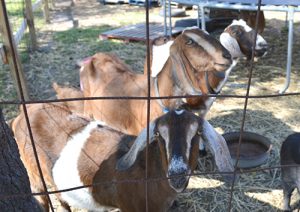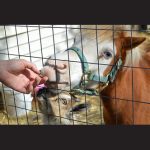
BISHOPVILLE – On the back portion of Joe Timmons’s property stands an old barn his grandfather and great-grandfather built nearly 70 years ago, with five pens surrounding the structure.
The first pen contained little pygmy goats and their mothers, followed by the buck pen, the “maternity ward” pen, the misfit goat pen and the Nubian goat pen.
“We fell in love with the animal,” he explained. “They are as sweet as can be. We don’t have a mean one amongst the 35.”
Timmons said he and his wife, Amy, started raising a few pet pygmy goats as a hobby. As the heard grew large, however, he explained that they started to reevaluate the purpose of having so many goats.
“It started to get to the point where we had a lot of goats, so we were spending more and more money on food,” he said. “We started to ask, ‘Why? To what end was this?’”
They directed their questions into research and soon afterwards discovered the benefits of goat milk products.
“The fat content in goat milk is higher than in cow’s milk, which lends itself to healing and goes better into human skin,” Timmons said.
From there, they began using milk from the Nubian goats on their property and created soaps, unscented and vanilla sugar lotion.
Since that time, the couple started Goatopia LLC and expanded their products to include 20 kinds of lotions, lip balm, shampoo bars, laundry detergent and more.
 Timmons said their business takes a more holistic approach of sorts to caring for goats, from the local hey the animals eat to the natural remedies they use. For example, Timmons said he feeds the goats sweet potatoes, yogurt and a food of their choice to get rid of a common digestive illness called scours.
Timmons said their business takes a more holistic approach of sorts to caring for goats, from the local hey the animals eat to the natural remedies they use. For example, Timmons said he feeds the goats sweet potatoes, yogurt and a food of their choice to get rid of a common digestive illness called scours.
In the end, he said between 20 and 50 percent of the Nubian’s milk will be used to create Goatopia products. The four Nubian goats they now own make two gallons of milk on a daily basis.
Timmons said much of the knowledge they acquired about their craft came from reading and research, but explained his knowledge of goats came from friends and those he bought the goats from.
Timmons now spends much of his time attending fairs and farmers markets, selling Goatopia products and educating the community about goats, their milk and the misconceptions surrounding the animal.
For example, he said many didn’t know that all goats have horns and that the animals are browsers, not grazers.
“They’re like a man with a TV remote,” he joked, “searching for something better even if he likes what he is watching.”
Recently, Timmons said students from both Parkside High School’s horticulture program and Salisbury University have visited his farm to learn about goats and their craft.
“We taught them about goats and that kind of thing, and then we showed them what we did,” he explained.
In addition to expanding his Nubian goat population, Timmons said he hopes to continue his educational outreach. In the coming weeks, they will participate in several other learning opportunities with nearby schools and churches.
“I like the notion of educating,” he explained. “People don’t know about these animals.”
Timmons said he is currently working on a license to sell his products on his property, but encouraged families to come visit the goats, as well as other animals that accompany them.
“People are welcome to bring the kids by, play with the goats and that kind of thing,” he said. “If they want to check out a lotion or something, they certainly can.”
For more information on Goatopia, visit goatopiallc.com or visit Goatopia LLC’s Facebook page.

